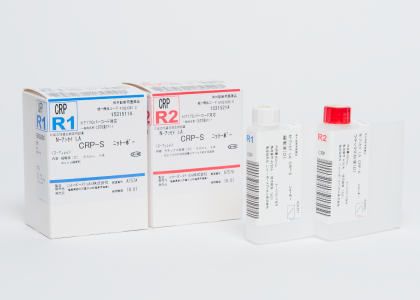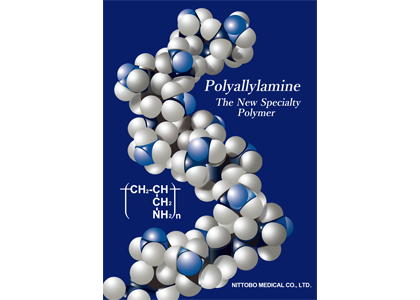Nittobo Group strives to contribute to the realization of an enriched society,
serves as a valued corporate group in society, and commits to the creation of comfortable life.
Medical
Holding one of the largest shares in the plasma-protein-based in vitro diagnostic (IVD) reagent market in addition to offering functional polymers worldwide
In the Nittobo Group, Nittobo Medical Co., Ltd., a wholly owned subsidiary of Nittobo, drives its medical business by focusing on reagents for IVD tests and its specialty chemicals business by focusing on functional polymers.
IVD reagents are used for tests on samples such as blood and urine to check health conditions and are familiar to healthy people since they are used for health checkups and physical examinations. Nittobo Medical's IVD reagents achieve both high quality and stable supply by producing from the main raw materials to the finished products within the Nittobo Group in an integrated manner. The reagents are favorably rated for their high quality and used in medical field worldwide, Nittobo Medical has gained the largest market share in more than 10 test categories in Japan.
The specialty chemicals division develops and distributes highly unique functional polymers (poly-allylamine and polyamine series). The strong points of our business is to conduct R&D in close cooperation with various manufacturers and research institutions such as chemical products and pharmaceuticals manufacturers, and to propose products which meet customers' needs. We have many businesses in niche markets and is actively developing our business not only in Japan but also in oversea markets.
History of our businesses
Developing from research in chemical fibers
Nittobo's medical business first saw the light of day at its former Chemical Fiber Laboratory around 1965. In those days, the Chemical Fiber Laboratory shifted its focus of research from synthetic fibers to fine chemicals. Driven by their belief that biochemistry would lead the chemistry industry in the next generation, the Laboratory started research on amino acid peptide derivatives, which was completely new research area from the original business. This research yielded results that prompted the company to promote the development of biochemical diagnostic reagents. In 1985, partly because the market for immunological diagnostic reagents was expanding, the company established tie-ups with International Immunology Corporation and Midland BioProducts Corporation (the predecessors of Nittobo America Inc.), both of which produced antisera, the raw materials for immunological diagnostic reagents and started to accumulate technologies to develop IVD reagents and know-how to produce antisera. This laid the foundation for today's medical business.
Polyaminesulfone, which Nittobo's specialty chemicals business originated with, was also synthesized at the former Chemical Fiber Laboratory. The Laboratory invented and developed this polyaminesulfone as a by-product of the research in organic fibers such as acrylic fibers. Based on this functional polymer, we have continued to develop new high molecular polymers and as a result of our R&D activity to meet customers' needs, we could continue to create our diverse polymers essential to people's living, such as dye fixing agent and ink fixing agent.
Business overview
In vitro diagnostic reagents
Achieving stable supply through its proprietary technologies and the Group's integrated production system
Nittobo Medical Co., Ltd. develops, manufactures, and sells reagents for in vitro diagnostics (IVD) mainly in immunology, biochemistry, and hematology area. In particular, we started manufacturing plasma-protein-based IVD reagents for immunological tests in 1988, and we have gained firm trusts on these products mainly from medical institutions. “Nittobo as a specialist in immunology”. As of today, we continue to support medical professionals not only in Japan but also around the world.

Functional polymers
Proposing solutions to latent problems in close cooperation with our customers
Specialty Chemicals Division develops functional polymers that fits with customers' needs. Up to now, we have developed products such as ink fixing agent; fixatives for paper, fiber and films, and auxiliary agent for metal plating. We are developing solutions not only for visible problems but also latent problems including various needs from the actual manufacturing site. We continue to develop the possibility of our functional polymers to various fields such as medical, automobile, and others.

- Business introduction
- Glass Fiber
- What is glass fiber?
- Special materials
- Composite materials
- Yarn
- High-performance glass cloth
- Industrial materials
Interior furnishings market
Market for exterior furnishings
Construction market
Lifestyle, sports, and leisure markets
Media market
Automobile and aircraft markets
Heat resistance and heat insulation markets
Civil engineering market
Market for industrial base materials
- Medical
- Textile


